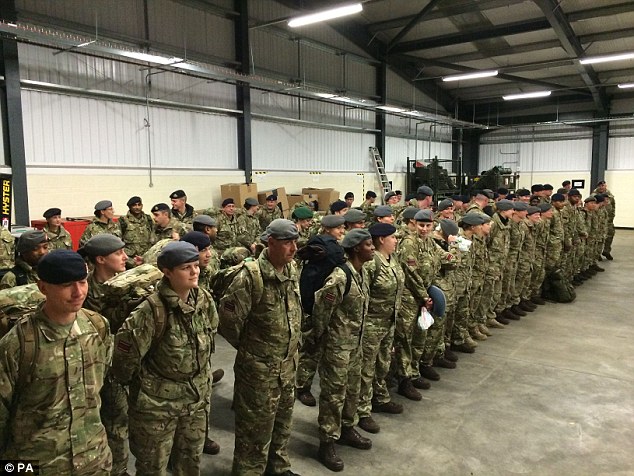IATF Headquarters, Dec 21

British and Canadian Military Medics arrive in Sierra Leone to join the fight against Ebola. Yesterday saw 100 military personnel from Britain and Canada join the Department for International Development led operation in Sierra Leone. The medical clinicians, Nurses, Lab technicians and doctors flew into Freetown, Sierra Leone where they will be based for the next 2-6 months. Many of the British personnel, including 15 reservists alongside their Canadian counterparts will head to the UK built Kerry Town Ebola Treatment Centre facility situated on the outskirts of the capital. The treatment staff will spend a period of 60 days working within the patient wards delivering frontline support to the confirmed and suspected patients that have been admitted to the 12 bed facility.Lt Col Gary O’Neil, Canadian Task Force Commander (Op SIRONA) said: “We are excited about coming on a humanitarian mission. We have been training hard and integrating well with the ‘Brits’, and now we are really looking forward to the mission ahead.”
Over the coming month these personnel will work closely with their predecessors to establish themselves and orientate themselves for their task. Handover training days and procedure practice will prepare them for the change over in early January. Building upon the training delivered at Strensall, York, the teams will acclimatize to the 35oC heat and new surroundings whilst handing over from the teams currently working at the treatment facility. Sgt Lance Cekill, said: “It was a relatively short flight from Britain to Freetown and it is great to finally get here. We have already made good friends with our Canadian colleagues and the team is looking forward to starting.”
ENDS
Background
-
This is an unprecedented outbreak with the potential to affect many countries, and tackling the disease requires significant and urgent support.
-
The UK is leading the international response to the Ebola crisis in Sierra Leone by diagnosing and isolating Ebola cases more quickly, doubling the number of treatment beds, supporting burial teams and researching a vaccine.
-
Playing our part in halting the disease in West Africa is the most effective way of preventing Ebola infecting people in the UK.
-
We have already delivered hundreds of treatment and isolation beds, 3 new Ebola testing laboratories and we are working closely with Sierra Leone government to train and equip burial teams toensure safe burial practices.
-
ut as the disease continues to spread in Sierra Leone, it is clear that even more is needed. That is why we have opened 5 new treatment centers, increasing the number of beds and have opened 3 testing laboratories.
UK Response The UK has committed £232.5 million to the response in Sierra Leone. This includes:
-
Supporting over 880 treatment and isolation beds. This includes building 6 Ebola treatment centres in Kerry Town, Port Loko, Hastings, Makeni, Goderich and Moyamba.
-
Working with the Ministry of Health to help shore up the country’s stretched public health services to contain the disease. This includes funding for vital supplies such as chlorine and protective clothing for thousands of health workers and ensuring that every primary healthcare unit has been trained and receives supervision in infection prevent control;
-
Funding the Ebola Response Consortium, UNICEF and others to open safe isolation beds where people who suspect they might be suffering from the disease can seek swift and accurate diagnosis and appropriate care;
-
Working with Public Health England, the Government of Sierra Leone and WHO to strengthen the overall laboratory system. This includes building, running and staffing three new labs in Sierra Leone, doubling the number of tests that can be carried out every day;
-
Supporting NGOs on the ground through the Social Mobilisation Action Consortium to work with people to agree practices which will allow them to honour their friends and relatives, while ensuring bodies are safely buried;
-
Supporting over 100 burial teams nationally and their fleet. On average 95% of reported bodies are being buried within 24 hours. Late alerts account for the other 5% which are safely contained by the police until a burial team can be dispatched in the morning;
-
Supporting the national Ebola response fleet with fleet management, maintenance and fuel to maximise the efficiency of resources and teams in the 12 districts outside of the Western Area. This also includes the decontamination of ambulances to ensure a safe ambulance service;
-
Establishing a £5 million DFID Emergency Ebola Response Fund to maximise treatment and isolation beds and meet urgent needs. The fund has already approved approximately 50% of the funds for essential activities.


Be the first to comment